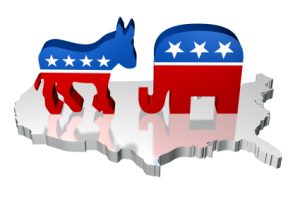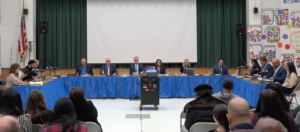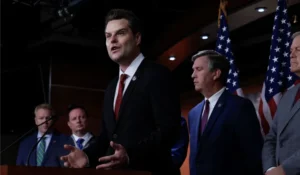Finding a Middle Ground in Classroom Politics

School is often thought of as an environment that is accepting of all people regardless of ethnicity, religion, or other factors of discrimination. Political opinions however, may be a different matter. Politics are a daily topic of conversation wherever you go, including school. When it comes to problems in our country, Republicans blame Democrats and Democrats blame Republicans; however, their rationales never fail to outrage, intrigue, and confuse. Political discussions in school are often questionable in their intentions and effects. At High School West, it is no secret that certain teachers have very strong political opinions that are often expressed to their students. But is this appropriate? What role should teachers really play in students’ political development?
Politics is notoriously a very sensitive subject. People are known to have fragile emotions connected to certain political beliefs, especially social aspects like gay marriage and abortion. Teachers hold the responsibility of providing students with a safe learning environment where everyone feels comfortable. However, if a teacher were to mention a subject sensitive in class, he or she can hence cause a student to feel uncomfortable. School is not a place for anyone to feel insulted according to their beliefs. Often religion is intertwined in politics, and certain political or social ideas, such as abortion, gay marriage, or women’s rights, play an important role in one’s beliefs. Students may not only feel insulted on a religious and moral basis, but end up disrespecting their teacher and feeling insecure in the classroom, thus hindering their education. A school’s curriculum is, in theory, supposed to be rooted in a political middle ground between conservative and liberal views. Our teachers should therefore be equally unbiased and accepting of both sides of the political spectrum as it relates to classroom discussion. When it comes to social issues, it is not a teacher’s place to comment with his or her own feelings. There is too much to risk. However, teachers should be able to express both sides of a situation in an unbiased manner to allow ambivalent students to choose a stance on important issues.
However, the intentions of a teacher have to be taken into account. Often, teachers express opinions in order to initiate thought and debate amongst their students as they analyze information. Sometimes though, teachers may be venting their own political views and making it feel like they are trying to impose those beliefs on their students. Mrs. Crowe, an AP English Language and Composition teacher, believes that educators should be “allowed to express their political opinion to their students in order to allow them to think and debate amongst themselves. [It is] important for opinions to be questioned so one can form stronger arguments.” Her statement does have merit. Why should teachers have to walk on eggshells around their students when their ideas and opinions actually may benefit their development as informed adults? Not everyone has the same opinion, but teachers should still be allowed to mention current events and debate how they are affecting our society in the classroom. Social Studies teacher Mr. Ferretti offered up a different opinion on the topic. “It’s likely you’ll be doomed to be one sided but you should at least try not to be that way in the classroom,” commented Mr. Ferretti.
One can argue that it all boils down to parents. Children often reflect the values of their parents, usually following the same political party and therefore sharing similar political beliefs. By questioning a student’s opinions, a teacher is in theory questioning what their parents taught them, which can be difficult for a child to digest. Different teachers believe different things in regard to their ability to speak about politics to their students. There is no right or wrong answer to the question of politics in the classroom, however I believe that an unbiased statement regarding both sides to a certain issue allows for debate and thought within itself, and so long as the goal of a class debate is not to vent about personal beliefs, the goal of sparking inquiry will be achieved without the risk of being offensive.







